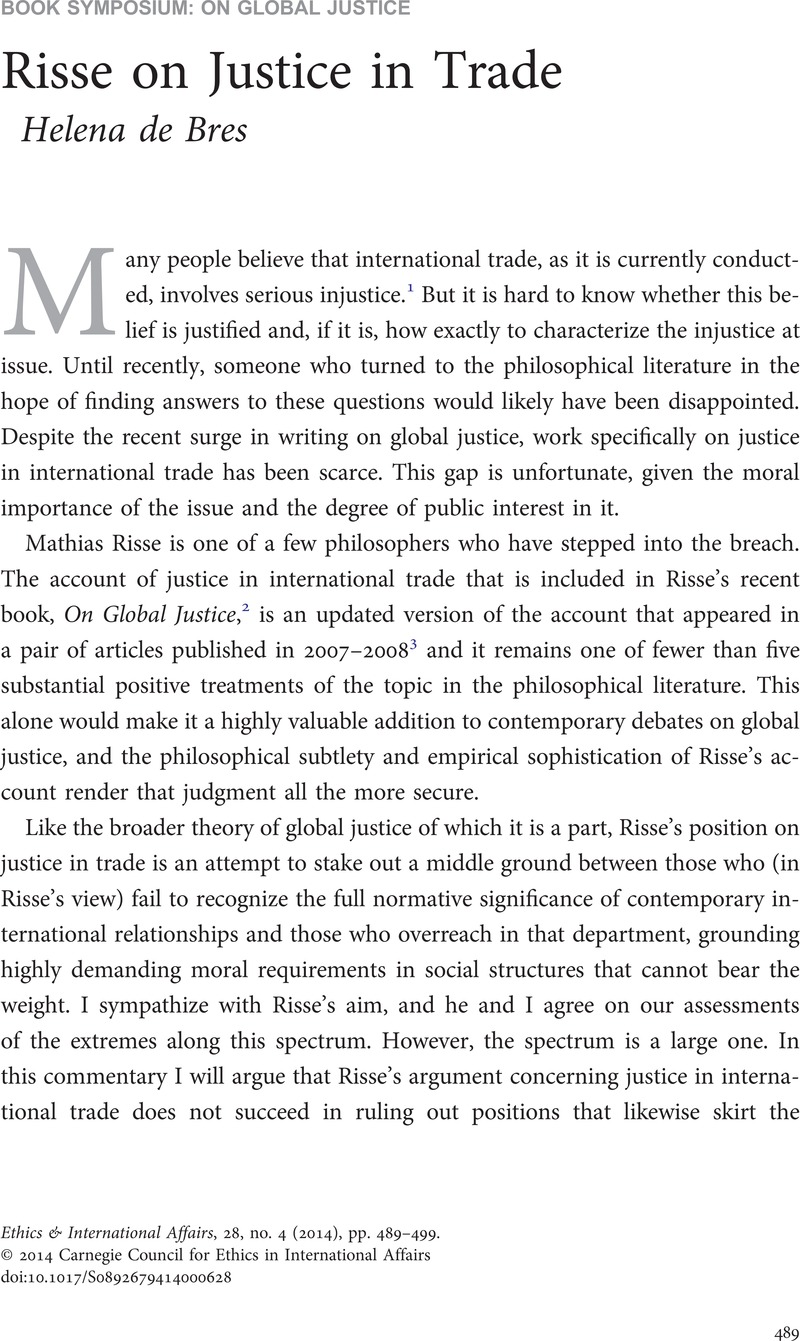Article contents
Risse on Justice in Trade
Published online by Cambridge University Press: 12 December 2014
Abstract

- Type
- Book Symposium: On Global Justice
- Information
- Copyright
- Copyright © Carnegie Council for Ethics in International Affairs 2014
References
NOTES
1 This essay was prepared for an author-meets-critics session at the American Philosophical Association Pacific Division meeting, San Diego, April 19, 2014. I am grateful to Gillian Brock for organizing the panel; to the other participants, Richard Arneson and Anna Stilz, for their contributions; and to Mathias Risse for his thought-provoking book.
2 Risse, Mathias, On Global Justice (Princeton, N.J.: Princeton University Press, 2012)Google Scholar. The bulk of the account appears in chapter 14.
3 Risse, Mathias, “Fairness in Trade I: Obligations from Trading and the Pauper-Labor Argument,” Politics, Philosophy & Economics 6, no. 3 (2007), pp. 355–77CrossRefGoogle Scholar; Kurjanska, Malgorzata and Risse, Mathias, “Fairness in Trade II: Export Subsidies and the Fair Trade Movement,” Politics, Philosophy & Economics 7, no. 1 (2008), pp. 29–56CrossRefGoogle Scholar.
4 James, Aaron, Fairness in Practice: A Social Contract for a Global Economy (New York: Oxford University Press: 2012)CrossRefGoogle Scholar.
5 Cohen, Joshua and Sabel, Charles, “Extra Rempublicam Nulla Justitia?,” Philosophy and Public Affairs 34, no. 2 (2006), pp. 147–75CrossRefGoogle Scholar, at p. 154.
6 One of the most significant and controversial features of the Uruguay Round that instituted the post-GATT WTO regime was its expansion of the scope of multilateral trade rules much further into countries' internal regulatory and legal systems than had previously been attempted. The most prominent instances were the agreement on Trade-Related Aspects of Intellectual Property, the agreement on Trade-Related Investment Measures, the General Agreement on Trade in Services, the Agreement on Sanitary and Phytosanitary Measures, and the Subsidies Agreement. These agreements were intended to protect existing market access commitments (by preventing governments from using domestic policy to disadvantage imports once they had crossed the border) and/or to extend and facilitate trade flows.
7 Stiglitz, Joseph and Charlton, Andrew, Fair Trade for All (New York: Oxford University Press, 2005)Google Scholar, p. 103.
8 Finger, J. Michael, “Implementation and Imbalance: Dealing with Hangover from the Uruguay Round,” Oxford Review of Economic Policy 23, no. 3 (2007), pp. 440–60CrossRefGoogle Scholar, at p. 440.
9 Dani Rodrik, “The Global Governance of Trade: As if Development Really Mattered” (New York: United Nations Development Programme, 2001), pp. 25–27.
10 It is sometimes argued that, despite the burdens mentioned above, the Uruguay Round's “behind the border” rules are nonetheless of net benefit to developing countries, given that they promote free trade. This overstates the economic rationale for the rules in question. In the case of TRIPS, for instance, many economists have claimed that the standard welfarist arguments for domestic intellectual property protection are insufficiently compelling in the international case to justify a global intellectual property regime. See, e.g., Trebilcock, Michael and Howse, Robert, The Regulation of International Trade, 3rd ed. (New York: Routledge, 2005), pp. 400–401Google Scholar.
11 OECD, “Assessing the Effects of the Uruguay Round,” Trade Policy Issues 2 (Paris: OECD, 1993)Google Scholar.
12 Finger estimates that, for China, TRIPS generated payment obligations that were five times larger than the gains from goods liberalization achieved in the Uruguay Round (Finger, “Implementation and Imbalance,” p. 456).
13 Stiglitz and Charlton claim that, taken together, the forty-eight least developed countries may be losing U.S. $600 million a year in total (net) due to the round (Stiglitz and Charlton, Fair Trade for All, p. 47).
14 I have focused here on the normative concerns that Risse's principle leaves out. But I am also concerned about the specific content of Risse's principle. Risse acknowledges that his suggestion that workers be compensated in accordance with the value of their contribution (where that value is not determined purely by facts about supply and demand) requires more theoretical development (Risse, On Global Justice, p. 273). I am not confident that an adequate account is to be found.
15 Richard Miller's theory of global justice, and of justice in trade in particular, centers on such a duty. See Miller, Richard, Globalizing Justice (New York: Oxford University Press, 2010), pp. 60–83CrossRefGoogle Scholar.
16 See Risse, On Global Justice, p. 49: “If indeed the conditions characterizing shared membership in a state as a ground are jointly sufficient to generate principles of justice, we can sensibly inquire about a set of weakened versions of the conditions that apply to states and explore whether they too generate principles of justice, which would be different principles nonetheless.”
- 2
- Cited by


